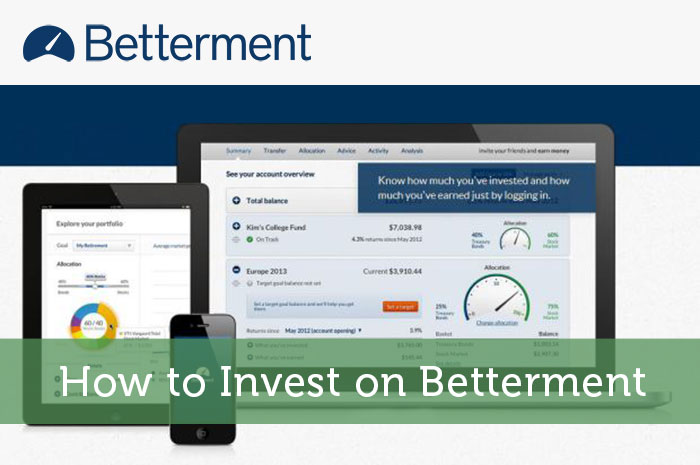We all know that online investing isn’t a new thing, and many well-known trading companies use very clever (and sometimes humorous) marketing techniques to make people believe that they have a simple solution that anyone can follow. And if you’re a football fan like I am, you know about the famous “E*TRADE baby” who has been made to sound like an easy-going (and sometimes cynical) middle-aged adult.
The bottom line is that there is no quick and easy way to start investing, and if you don’t have the right tools you can find yourself falling deep into the proverbial rabbit hole. But with all the different strategies and techniques out there, how can you know which ones will work?
Founded by Jon Stein, Betterment is designed to make investing easier for beginners, and it offers lower investment fees than many of its competitors, which can be a great way to cut costs. The website has a very simple and easy-to-use interface, and it has a very minimalist design. This can be a huge advantage for someone who lacks the technical savvy to navigate a complicated platform.
Click for Betterment Pricing and Details.
Types of Investments
Betterment offers a variety of investments, such as:
- Stocks
- Bonds
- ETFs
- Mutual funds
It also offers retirement accounts, such as traditional and Roth IRAs. You can even do a rollover from another qualified retirement account (such as a 401(k) or tax-sheltered annuity).
You do have to bear in mind that Betterment does not have FDIC protection, which can increase your risk in the market. But like any other type of investing, there is a chance that you will lose money. There is no guarantee that you will succeed, which is why it’s important to exercise caution before you decide to pull the proverbial trigger on an investment.
See how it compares: M1 Finance vs. Betterment
Investing in Mutual Funds
Mutual funds can be good investments for people new to the market, and you can get a good return if you choose the right kind of industry. A pool of people collectively put their money into a mutual fund in the hopes that they will get a positive return, and they are often managed by a company that will make investment choices in an effort to increase its value.
There are two types of mutual funds:
- Actively-managed
- Index funds
Recommended Stock Investing Posts:
Actively-managed mutual funds will have higher operating costs, as the people who manage these accounts will play a more active role in making investment decisions. These types of mutual fund managers charge more for this service. So, you should bear that in mind before you decide to put your money into this type of mutual fund.
Indexed mutual funds, on the other hand, do not offer this type of service. So, their operating costs will be lower. This will typically be a better investment, as index funds performed better than actively managed funds in a recent study that was conducted on January 2014. In this study, index funds outperformed actively managed funds 83% of the time in a 15-year period.
Diversification
Some of you might have heard this term before, but you might not be sure what it means. To put it simply, it’s the concept of not putting “all your eggs in one basket.” In other words, you should invest in a variety of assets, and you should put your money into a variety of markets. In a recent study, diversified portfolios performed 1.4% better in a 10-year period than those that were not.
Sweating the Details
You might have heard people tell you that you shouldn’t “sweat the details,” but in the world of investing that is precisely what you should do. Keeping a close eye of the different parts of your portfolio (especially those that involve operating costs and investment fees) can help you get a better return in the long run. Reinvesting your dividends and rebalancing your accounts on a regular basis will help to maximize the performance of your portfolio.
And this may not be a revelation to some people, but you should never invest based on impulse or emotion. Many investors make this mistake, as they are often motivated by either greed or the allure of making a “quick buck.” Many of them don’t realize that following this investment strategy defeats the purpose of what they’re trying to do. Purchasing an investment based on a gut feeling, or making a “spur of the moment” decision, can often result in bad timing or making poor choices. You should analyze each investment carefully, and you should make your decision based on your goals.
Conclusion
If you’re thinking about investing in the stock market, it’s important to equip yourself with the right knowledge. But it’s even more important for you to be informed of the proper strategies and techniques that will help you achieve your investment goals. Signing up with Betterment is easy, and learning how to use their system is even easier. So, if you’re new to the world of investing it will be a great place to start.
Click for Betterment Pricing and Details.
Betterment Comparisons:
- Betterment vs Wealthfront
- Betterment vs Acorns
- Betterment vs Vanguard
- Betterment vs Fidelity
- Betterment vs Robinhood
- M1 Finance vs Betterment
- Betterment vs Sofi
- Betterment vs Stash
- Betterment vs Charles Schwab
- Betterment vs Personal Capital
- Betterment vs Ellevest
- Betterment vs ETrade
- Betterment vs Wealthsimple
Related Investing Product Reviews:






So many people would be better off by switching to Betterment. I suppose it’s only a matter of time. How much are they at now like $5 billion in assets?